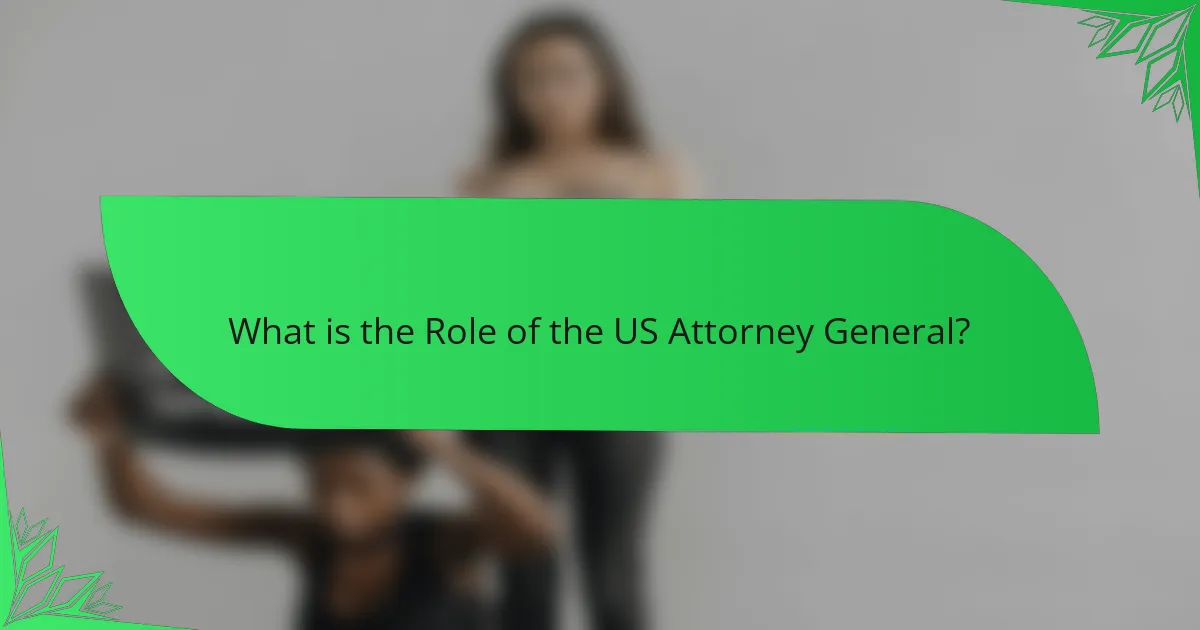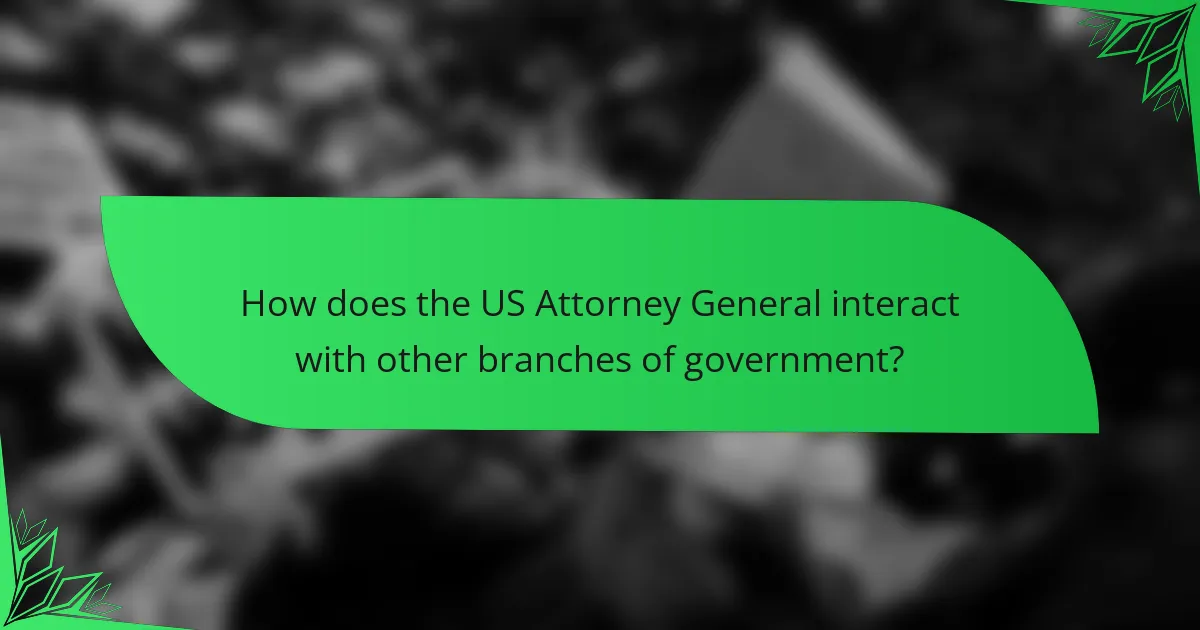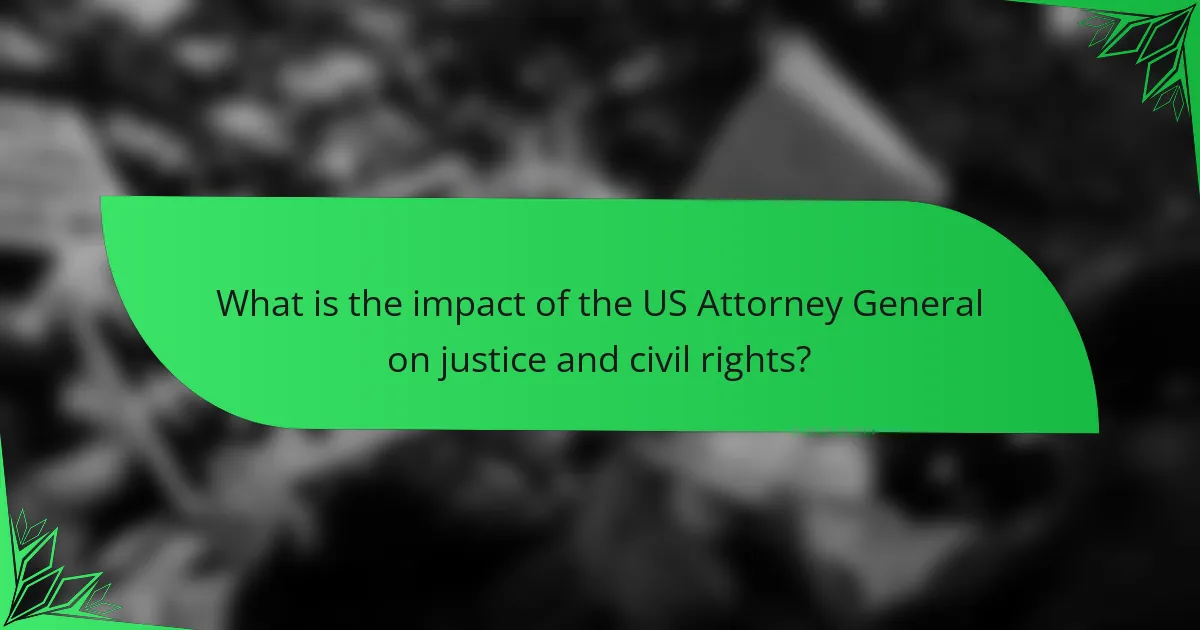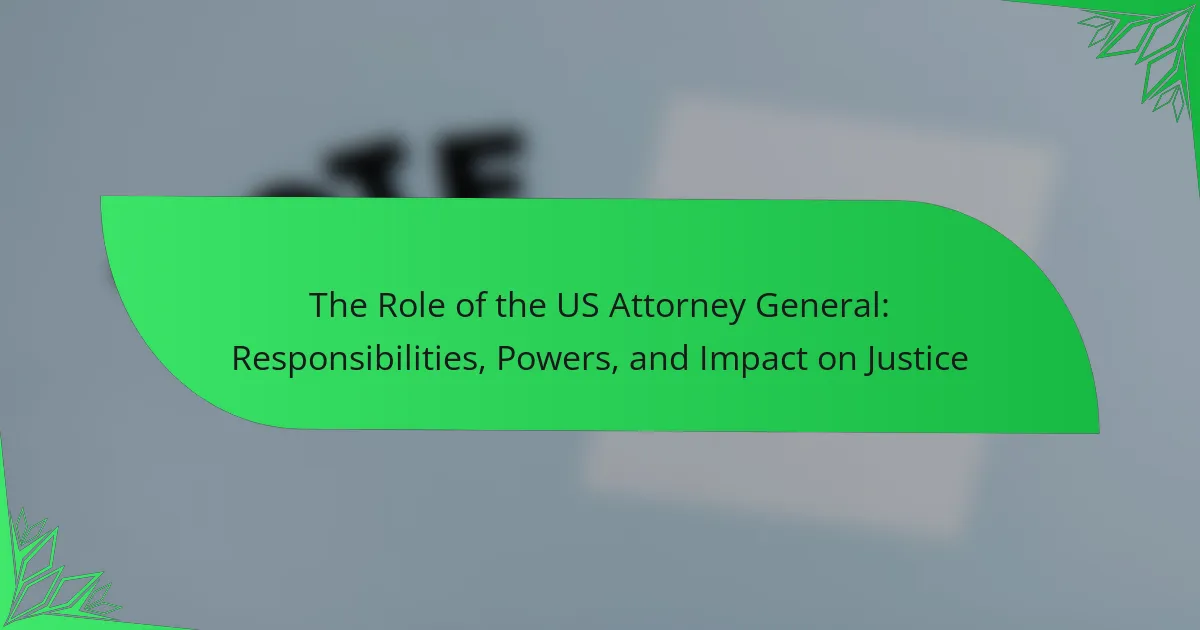The US Attorney General is the head of the Department of Justice, responsible for enforcing federal laws, advising the President on legal matters, and overseeing federal prosecutors. This position plays a crucial role in ensuring fair administration of justice, addressing significant legal issues such as civil rights and criminal justice reform, and managing federal law enforcement agencies like the FBI and the Drug Enforcement Administration. The Attorney General interacts with other branches of government, collaborates with state agencies, and influences judicial proceedings to uphold the rule of law. Through enforcement actions and legal opinions, the Attorney General impacts justice and civil rights, shaping national discourse on these critical issues.

What is the Role of the US Attorney General?
The US Attorney General serves as the head of the Department of Justice. This position is responsible for enforcing federal laws and representing the United States in legal matters. The Attorney General advises the President on legal issues and oversees federal prosecutors. This role includes ensuring fair and impartial administration of justice. The Attorney General also addresses significant legal issues such as civil rights and criminal justice reform. Additionally, the Attorney General manages federal law enforcement agencies. This includes the FBI and the Drug Enforcement Administration. The position is critical for maintaining the rule of law in the country.
What are the primary responsibilities of the US Attorney General?
The primary responsibilities of the US Attorney General include overseeing the Department of Justice. The Attorney General represents the United States in legal matters. The role involves enforcing federal laws and ensuring fair administration of justice. The Attorney General also provides legal advice to the President and federal agencies. Additionally, the Attorney General oversees federal prosecutors and law enforcement agencies. The position requires upholding civil rights and addressing major legal issues. The Attorney General is responsible for initiating legal action to protect the public interest. These responsibilities are defined under Title 28 of the United States Code.
How do these responsibilities impact federal law enforcement?
The responsibilities of the US Attorney General significantly impact federal law enforcement. These responsibilities include overseeing federal prosecutions and enforcing federal laws. The Attorney General sets priorities for law enforcement agencies, influencing resource allocation. This role helps shape national policy on crime and justice. For example, initiatives against drug trafficking or cybercrime are often spearheaded by the Attorney General. Furthermore, the Attorney General provides guidance on legal interpretations that affect law enforcement practices. This ensures consistency and adherence to federal law across various jurisdictions. Overall, the Attorney General’s responsibilities directly affect the effectiveness and focus of federal law enforcement efforts.
What are the key areas of jurisdiction for the US Attorney General?
The key areas of jurisdiction for the US Attorney General include federal law enforcement, legal representation for the United States, and oversight of federal prosecutors. The Attorney General enforces federal laws and ensures public safety against foreign and domestic threats. This role involves managing the Department of Justice and its various divisions. The Attorney General also handles civil rights enforcement and oversees immigration and naturalization laws. Furthermore, the Attorney General provides legal advice to the President and executive branch agencies. This jurisdiction is defined by the Attorney General’s mandate outlined in the U.S. Code.
What powers does the US Attorney General hold?
The US Attorney General holds significant powers as the head of the Department of Justice. This role includes overseeing federal law enforcement agencies. The Attorney General can initiate legal actions on behalf of the United States. They also provide legal advice to the President and executive branch agencies. Additionally, the Attorney General has the authority to enforce federal laws and regulations. They can influence policy on issues like immigration and civil rights. This position also includes the power to appoint U.S. Attorneys in various districts. The Attorney General’s decisions can shape national legal standards and practices.
How does the Attorney General influence federal legal policy?
The Attorney General influences federal legal policy through leadership of the Department of Justice. This role allows the Attorney General to set priorities for federal law enforcement. The Attorney General also provides legal advice to the President and executive branch agencies. This advice shapes the interpretation and implementation of federal laws. Additionally, the Attorney General can initiate or decline federal prosecutions. This discretion impacts which cases are pursued and how laws are enforced. The Attorney General’s influence extends to shaping regulations and policies that govern federal agencies. Historical examples include the implementation of civil rights laws and drug enforcement policies.
What role does the Attorney General play in legal proceedings?
The Attorney General represents the government in legal proceedings. This role includes overseeing federal prosecutions and ensuring the enforcement of federal laws. The Attorney General also advises the President and heads the Department of Justice. They have the authority to initiate lawsuits on behalf of the government. Additionally, the Attorney General can appeal cases and influence legal policy. They play a crucial role in upholding the rule of law in the United States. Their decisions can significantly impact legal outcomes and public policy.
Why is the US Attorney General significant in the justice system?
The US Attorney General is significant in the justice system as the chief law enforcement officer of the federal government. This role includes overseeing the Department of Justice and ensuring the enforcement of federal laws. The Attorney General represents the United States in legal matters and provides legal advice to the President. Additionally, the Attorney General plays a crucial role in shaping national legal policy and addressing issues such as civil rights and criminal justice reform. The position has been influential in landmark cases, including those involving civil rights legislation. The Attorney General’s decisions can set legal precedents that impact the justice system nationwide.
How does the Attorney General contribute to public safety?
The Attorney General contributes to public safety by enforcing federal laws and overseeing the Department of Justice. This role includes prosecuting criminal cases and ensuring that laws are applied fairly. The Attorney General also provides guidance to state and local law enforcement agencies. They issue legal opinions that can shape public safety policies. Additionally, the Attorney General leads initiatives to combat crime, such as human trafficking and drug trafficking. Statistical data shows that effective law enforcement strategies can reduce crime rates. The Attorney General’s actions directly impact community safety and trust in the justice system.
What historical context shapes the role of the US Attorney General?
The role of the US Attorney General is shaped by historical context that includes foundational legal precedents and evolving societal expectations. Established in 1789, the position was created to advise the president and represent the federal government in legal matters. Over time, landmark cases, such as Brown v. Board of Education in 1954, expanded the Attorney General’s role in civil rights enforcement. The Watergate scandal in the 1970s led to increased scrutiny of the position and emphasized the need for independence from political influence. Legislative changes, such as the USA PATRIOT Act post-9/11, further transformed the scope of the Attorney General’s responsibilities. These historical events collectively illustrate the evolution of the Attorney General’s role in addressing both legal and societal challenges.

How does the US Attorney General interact with other branches of government?
The US Attorney General interacts with other branches of government primarily through legal advice and enforcement of federal laws. The Attorney General advises the President on legal matters and represents the United States in legal cases. This role includes working with Congress to provide testimony on legal issues and legislative proposals. The Attorney General also collaborates with state governments and agencies to uphold federal laws. Furthermore, the Attorney General’s office can influence judicial proceedings by filing amicus curiae briefs in significant cases. This interaction is essential for maintaining the rule of law and ensuring that justice is served across the nation.
What is the relationship between the Attorney General and Congress?
The Attorney General serves as the chief legal advisor to the government and represents the United States in legal matters. The relationship between the Attorney General and Congress involves oversight and accountability. Congress has the authority to confirm the President’s nominee for Attorney General. Additionally, Congress can hold hearings to question the Attorney General about legal issues and policies. The Attorney General may also provide testimony and reports to Congress on matters of law enforcement and justice. This relationship is essential for maintaining checks and balances within the federal government. The Attorney General’s actions can influence legislative priorities and public policy.
How does the Attorney General report to Congress?
The Attorney General reports to Congress through various means, including written reports and testimony. The Attorney General submits an annual report to Congress detailing the activities and performance of the Department of Justice. Additionally, the Attorney General may appear before congressional committees to provide updates and answer questions. This process ensures transparency and accountability in the administration of justice. Congressional oversight allows lawmakers to assess the effectiveness of the Department’s initiatives. The Attorney General’s communication with Congress is vital for legislative support and funding. These reporting practices are established by law and tradition.
What oversight mechanisms exist for the Attorney General’s actions?
Oversight mechanisms for the Attorney General’s actions include congressional oversight, judicial review, and internal department checks. Congress can hold hearings and request reports to monitor the Attorney General’s activities. Judicial review allows courts to assess the legality of actions taken by the Attorney General. Additionally, the Department of Justice has internal protocols and offices, such as the Office of Inspector General, to investigate misconduct. These mechanisms ensure accountability and transparency in the Attorney General’s decisions and actions.
How does the Attorney General collaborate with state attorneys general?
The Attorney General collaborates with state attorneys general through various mechanisms. These include joint initiatives on legal issues and sharing resources. The Attorney General coordinates efforts to address national concerns, such as consumer protection and public safety. Regular meetings and conferences facilitate communication and strategy alignment. The National Association of Attorneys General (NAAG) serves as a platform for collaboration. This organization promotes cooperation on legal matters and policy development. Collaborative efforts enhance the enforcement of laws across jurisdictions. Such partnerships strengthen the overall justice system in the United States.
What are the benefits of federal-state collaboration in legal matters?
Federal-state collaboration in legal matters enhances efficiency and effectiveness in the justice system. This partnership allows for resource sharing, leading to improved investigations and prosecutions. It facilitates the exchange of information, which is crucial for addressing complex crimes that cross jurisdictional lines. Such collaboration can help streamline legal processes, reducing delays in justice delivery. Joint task forces often leverage the strengths of both federal and state agencies. This collaboration can result in more comprehensive legal strategies. Historical examples show that coordinated efforts lead to higher conviction rates. Overall, federal-state collaboration strengthens the rule of law and public safety.
How do state attorneys general influence federal policies?
State attorneys general influence federal policies through litigation, advocacy, and collaboration. They often file lawsuits against federal actions they deem unlawful or harmful. For instance, state attorneys general have challenged federal immigration policies and environmental regulations. This legal action can lead to significant changes in federal policy. Additionally, they advocate for state interests in federal discussions. They participate in coalitions to address issues like consumer protection and healthcare. Their collective voice can sway federal decision-making. Historical examples include the multi-state lawsuits against the Affordable Care Act. These actions demonstrate their power to shape federal policy outcomes.

What is the impact of the US Attorney General on justice and civil rights?
The US Attorney General significantly impacts justice and civil rights by enforcing federal laws and ensuring equal protection under the law. This role includes overseeing the Department of Justice, which handles civil rights cases. The Attorney General can initiate investigations into civil rights violations and prosecute offenders. Historical actions include the enforcement of the Voting Rights Act and desegregation efforts. The Attorney General also provides legal opinions that influence policy and litigation. For example, in recent years, the Attorney General has addressed issues such as police reform and voting access. These actions shape national discourse on justice and civil rights. Overall, the Attorney General plays a crucial role in upholding justice and protecting civil liberties.
How does the Attorney General address civil rights issues?
The Attorney General addresses civil rights issues through enforcement of federal laws. This includes investigating violations of civil rights statutes. The Attorney General can initiate lawsuits against entities that discriminate. They also oversee the Civil Rights Division, which focuses on protecting individual rights. Additionally, the Attorney General provides guidance on civil rights matters to federal agencies. They can also work with state and local governments to promote compliance with civil rights laws. Historical actions include landmark cases that have shaped civil rights protections. For example, the Attorney General’s involvement in cases like Brown v. Board of Education has had a lasting impact on desegregation.
What initiatives has the Attorney General undertaken to promote equality?
The Attorney General has undertaken several initiatives to promote equality. These initiatives include enforcing civil rights laws to protect individuals from discrimination. The Department of Justice has launched programs aimed at reducing racial profiling and addressing police misconduct. The Attorney General has also prioritized the protection of voting rights for marginalized communities. Additionally, there are efforts to combat hate crimes and support victims of discrimination. These actions reflect a commitment to uphold the principles of equality and justice for all citizens.
How does the Attorney General respond to civil rights violations?
The Attorney General responds to civil rights violations by investigating claims and enforcing federal laws. This includes initiating lawsuits against individuals or entities that violate civil rights. The Attorney General can also issue guidance and regulations to promote civil rights protections. Additionally, the office collaborates with other federal and state agencies to address systemic issues. Historical actions, such as the Civil Rights Division’s involvement in cases like Shelby County v. Holder, demonstrate this commitment. The Attorney General’s role is crucial in upholding justice and protecting citizens’ rights.
What challenges does the US Attorney General face in the justice system?
The US Attorney General faces several significant challenges in the justice system. One major challenge is political pressure. The Attorney General must navigate the complexities of political influence while enforcing the law impartially. Another challenge is resource allocation. Limited budgets can hinder the effectiveness of legal enforcement and prosecution. Additionally, the Attorney General deals with public perception. High-profile cases can lead to scrutiny and criticism from the public and media. The evolving landscape of crime, including cybercrime and drug trafficking, presents ongoing challenges. Balancing federal and state law enforcement priorities adds further complexity to the role. Finally, maintaining the integrity of the Department of Justice is crucial amid allegations of misconduct or bias. These challenges require adept leadership and strategic decision-making to uphold justice effectively.
How do political pressures affect the Attorney General’s decisions?
Political pressures can significantly influence the Attorney General’s decisions. These pressures may arise from the executive branch, Congress, or public opinion. The Attorney General often aligns with the priorities of the sitting President. This alignment can lead to decisions that reflect political agendas rather than impartial justice. For instance, during the Trump administration, the Attorney General’s stance on immigration enforcement was heavily influenced by the President’s policies. Additionally, Congressional inquiries and public sentiment can sway legal interpretations and enforcement priorities. Historical examples show that Attorneys General may prioritize cases that align with political interests over those that uphold legal standards.
What are the implications of public opinion on the Attorney General’s actions?
Public opinion significantly influences the actions of the Attorney General. When public sentiment shifts, it can pressure the Attorney General to adjust policies or prioritize certain issues. For example, widespread public concern over civil rights can lead to increased enforcement of related laws. Conversely, negative public opinion may result in the Attorney General being more cautious in pursuing controversial cases. Historical instances show that public outcry has prompted investigations and policy changes, demonstrating the power of collective opinion. Additionally, the Attorney General often uses public opinion to gauge the effectiveness of their initiatives and align with the electorate’s priorities.
What best practices can enhance the effectiveness of the US Attorney General?
Best practices that can enhance the effectiveness of the US Attorney General include fostering transparency and accountability. Transparency builds public trust in the office. Accountability ensures that actions are subject to scrutiny. Implementing strong communication strategies is also crucial. Clear messaging helps convey the office’s priorities and initiatives.
Regular engagement with community stakeholders can improve relationships. This includes outreach to civil rights organizations and local law enforcement. Data-driven decision-making should guide policy formulation. Utilizing evidence and statistics can lead to informed legal strategies.
Investing in staff training and professional development is essential. Well-trained staff can better address complex legal issues. Establishing clear performance metrics can evaluate the office’s effectiveness. Metrics provide a framework for continuous improvement.
Collaborating with other federal and state agencies enhances resource sharing. This can lead to more comprehensive approaches to justice. Finally, prioritizing public safety and civil rights ensures balanced enforcement of laws. This dual focus can enhance the overall impact of the office.
The US Attorney General is the head of the Department of Justice, responsible for enforcing federal laws, overseeing federal prosecutors, and representing the United States in legal matters. This article outlines the primary responsibilities and powers of the Attorney General, including their influence on federal law enforcement and legal policy. It also examines the Attorney General’s role in addressing civil rights issues, collaboration with state attorneys general, and the impact of political pressures on their decisions. Key areas of jurisdiction, challenges faced, and best practices for enhancing effectiveness are also discussed, providing a comprehensive overview of the Attorney General’s significance in the justice system.
